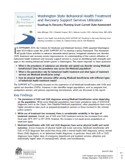In September 2019, the Centers for Medicare and Medicaid Services (CMS) awarded the Washington State Health Care Authority (HCA) $3.8 million under the §1003 SUPPORT ACT. Under this Phase 1 Planning Grant, HCA is developing an implementation strategy for improving treatment and recovery services, including developing an alternative payment model for SUD treatment and recovery services. An understanding of the current utilization of behavioral health treatment and recovery support services is crucial to identifying both strengths and gaps in the existing behavioral health system in Washington. A current state assessment was conducted to gain insight into the prevalence of substance use disorder (SUD) diagnoses, utilization of treatment services, and physical health and social outcomes among Medicaid beneficiaries with behavioral health diagnoses. The SUPPORT ACT is primarily focused on the experience of all Medicaid beneficiaries with SUDs and opioid use disorders (OUDs). However, it also identifies target populations, such as pregnant and postpartum women, and persons experiencing homelessness, which are included as populations of interest in the current state assessment. The current state assessment consists of four reports, each addressing a core question about existing behavioral health treatment and recovery support services in Washington:
- What is the prevalence of substance use disorder and opioid use disorder among Medicaid beneficiaries? Does the prevalence vary across the Medicaid population?
- What is the treatment penetration rate for behavioral health treatment? Does the rate vary across the Medicaid population?
- What types of substance use disorder treatment services are Medicaid beneficiaries using? Does treatment utilization vary across the Medicaid population?
- How do physical health and social outcomes differ among Medicaid beneficiaries with different types of behavioral health treatment needs?
Report and/or Additional Information:
Categories:
Related Publications:
- Frequency of Substance Use Disorder-Related Acute Events and Services Used After SUD-Related Acute Events (9.126)
- Predicting Receipt of Substance Use Disorder Treatment Among Medicaid Clients (4.111)
- Synthetic Estimates of Substance Use Treatment Need in Washington State (4.112)
- Washington State Behavioral Health Treatment Need and Service Utilization Update (9.130)
- Washington State Jail-based Opioid Treatment Networks: Disparities in Initiation of MOUD Treatment (4.115)

